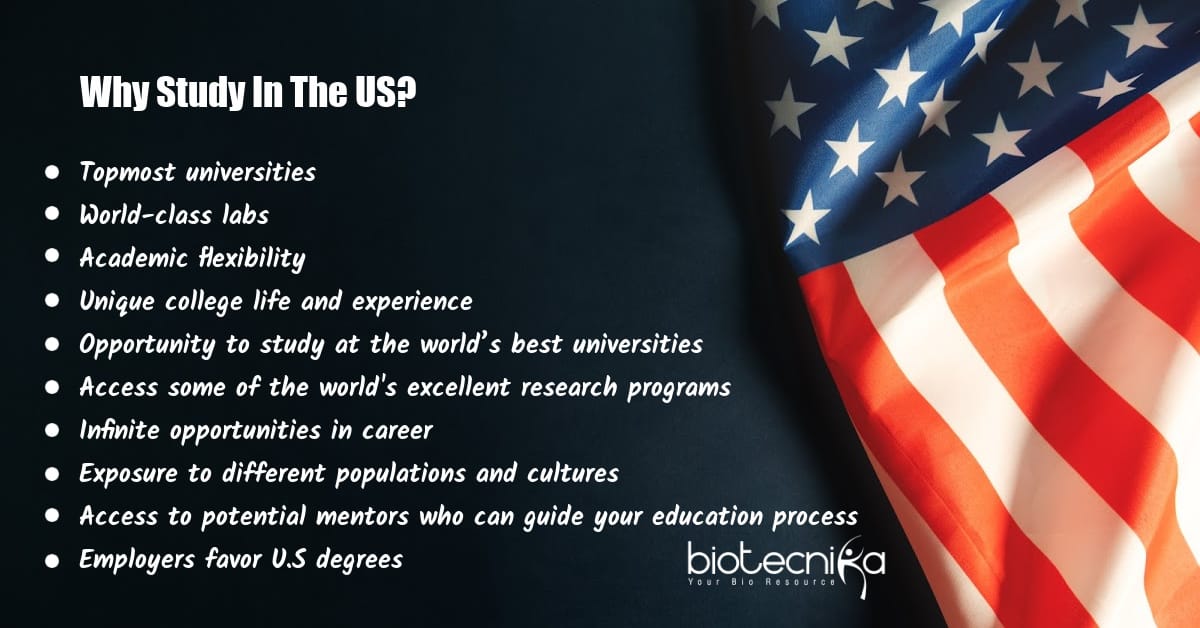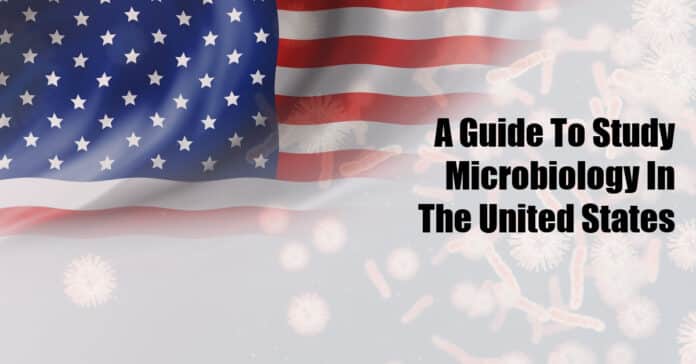Study Microbiology In US
Microbiology is the study of microscopic organisms, like bacteria, viruses, archaea, fungi, and protozoa. This domain involves basic research on the biochemistry, physiology, cell biology, ecology evolution, and clinical aspects of microbes, such as their interactions with humans and other organisms. These tiny microorganisms are crucial in understanding life on Earth, including human and animal disease, food production, and the environment.
Microbiologist’s works include the application of microbiology to food production, biotechnology, water purification, etc. They may work on infectious diseases by developing new vaccines or combating insects and diseases in plants, animals, and humans. The work may also involve works that use microbes in genetic modification and various other modern biotechnologies.
The Earth is teeming with life, and there’s so much to explore. Studying overseas is a great opportunity to encounter new animals, plants, and habitats and learn from world-leading scientists.
A person with a microbiology degree may find employment in industries like pharmaceuticals or health care testing labs, food industries, etc., where they can apply their knowledge about life processes.
Microbiology courses are offered at many universities and colleges across the globe. Studying overseas is now more important in an increasingly globalized world and offers many advantages to your education and career. You can pursue undergraduate, post-graduation, and doctorate-level degrees. Studying overseas is an excellent way to stand out from your peers by acquiring a distinct prospect in the domain.
As a microbiology student, you will learn about the life processes, structures, and functions of microbes. You will develop the lab skills required to work in scientific settings and involve with cutting-edge research taking place in the domain.

There are many specializations in this domain of microbiology; few of them are
- Agricultural microbiology
- Astro microbiology
- Bacteriology
- Cellular microbiology
- Evolutionary microbiology
- Microbial taxonomy
- Microbial systematics
- Generation microbiology
- Immunology
- Industrial Microbiology
- Medical Microbiology
- Microbial Ecology
- Microbial cytology
- Microbial ecology
- Microbial genetics
- Microbial physiology
- Microbial pathogenesis
- Molecular microbiology
- Mycology
- Nano microbiology
- Nematology
- Parasitology
- Pharmaceutical Microbiology
- Predictive microbiology
- Protozoology
- Phycology/algology
- Phylogeny
- Systems microbiology
- Virology

International students worldwide look to study in America because it brings them into contact with top-ranked universities, which are receiving more applications every year than ever before! There are over 80 colleges in the U.S offering degree courses in microbiology.

- Topmost universities
For students interested in academic excellence, studying in the United States will be the top priority. US university degrees are highly valued in the global job market. You might be aware of just a few top universities in the United States, like Harvard, Stanford, Yale, or MIT. However, there are more than 150 colleges and universities in the U.S with the most advanced labs.
- Tuition fees for anyone’s budget
The higher education system in America has been criticized for high tuition fees, but they also have a wide range of scholarships available too. The tuition fees vary from one state or university to another, but they can be between $5000-$25,000 per year for international students. Moreover, there are several scholarships, fellowships, and grants available which you can apply for.
- Academic flexibility
The academic flexibility a student gets in America is not common in many other nations. In many cases, you don’t have to declare a major until the 2nd year of the course. It implies that you can try out different subjects and classes, understand what interests you, determine what you don’t want to concentrate on, and only then make a choice. The students are provided quite a level of flexibility with respect to attendance, course requirements, and assignments. Yet, students still have to follow the rules set by their universities/colleges or their individual teachers.
- Unique college life and experience
You will get opportunities to work on cutting-edge projects using sophisticated lab equipment. US universities offer excellent facilities, such as libraries with vast collections of books, modern laboratories for lectures and practical sessions, sports arenas, or art studios.
You can find two types of classes – normal lecture-style classes and discussion-based, seminar-style classes, where it’s a small group of students debate or question various topics. You will have access to world-class professors and cutting-edge laboratories that are not available in many other countries.
- Visit and explore amazing places
You will be able to live in a multicultural environment and meet students from all over the world. Different cultures will give you a whole new perspective on life.

As per the 2018 QS World Ranking by subject, 6 out of the leading 10 colleges/universities offering Life Sciences degrees are from the U.S. many other countries are considerably advanced in microbiology, but the U.S. holds the top position.
Pursuing a degree in Microbiology from the USA comes with many advantages, including:
-
- Opportunity to study at the world’s best universities.
- Access some of the world’s excellent research programs.
- Infinite opportunities in career.
- Exposure to different populations and cultures.
- Opportunity for life-changing experiences that will benefit your future endeavors.
- Access to potential mentors who can guide your education process.
- World-class labs provide everything needed.
- Employers favor U.S degrees.

- Harvard University
- Massachusetts Institute of Technology (MIT)
- University of California San Francisco (UCSF)
- University of California San Diego (UC San Diego)
- Cornell University
- University of Pennsylvania
- University of Washington (UW)
- University of California, Berkeley
- Washington University in St. Louis
- Duke University

International students preparing to pursue a degree in Microbiology in the United States have some requirements they should be aware of first. Each university/college has its own requirements and eligibility guidelines that you need to follow if you want your application process to go smoothly – so make sure you do all necessary research beforehand!
You can get more details on each college’s admission process from their websites, where you can apply and register in their degree programs. Research and apply with the proper documents. The university system is one of the most prestigious systems in the world, so be prepared! Apply with all your materials ready, including transcripts and letters of recommendation if you have them.
For applying to a university in the U.S., you will generally be asked to submit the below-mentioned documents:
- Passport/ National Identity Card
- Testing scores
- Copy of past diplomas and degrees ((in case, applying for a master’s degree or doctoral degree)
- Resume/CV
- Passport size photographs
- References (at least two)
- Proof of scholarship or funding
- Letter of intent
- Language test score (IELTS/TOEFL)
- Minimum TOEFL score of 80, or IELTS score of 6.5 for International students
- Portfolio and/or writing samples
- Research experience
- GRE scores: 50% Verbal and 70% Quantitative
- International students whose first language isn’t English should submit English language proficiency tests like IELTS and TOEFL scores.
Note: You should always check on the university’s website to ensure what the exact requirements are.

If you want to pursue a degree in microbiology or life science, you may consider applying to a university that is specialized in this field. If your goal is more general, it can be preferable to study at a US public school as they are usually cheaper than private universities and offer many similar courses.
The process can vary from school to school, but there are some common steps involved: deadline dates (either posted on the college’s website or listed elsewhere), application fees, essays, recommendations, transcripts, and standardized test scores.
If the university offers on-campus housing for international students (most American universities do), this is a major benefit that you should consider when weighing your options.
Steps to apply
- Contact the international admissions office at universities
- Get all the documents required to apply to US universities ready
- Pass your English language test
- Research university application deadlines and fees
- Apply for a student visa

The American university system is one of the most prestigious systems globally, with a reputation that precedes it. With so much prestige and intense competition for admission at top universities, many students find themselves wondering how to qualify for an American university. It is important that you have the right qualifications and grades if you want to get accepted into one of these prestigious universities.

- Take preparation classes
Preparation classes make it possible for degree-seeking students to get an additional instructional boost right before they begin their degree programs.
Develop your English through an English-language prep course. If you wish to join a degree program in the U.S., you will need to prove that your language skills are good enough to participate in the classes and understand the lectures. These courses will also prepare you for any of the English-language tests that universities require.
- Degree equivalency
Double-check that your degree is equivalent to the American system. Most degrees are, but if you’re unsure about yours, research it before going too far in the application process!
- Essays and interviews
Prepare for the interview with questions like “Why do you want to attend this university?” or “What challenges have you in Microbiology in America?
American universities are looking for more than just your strong grades. They want to know that you’re driven and passionate about the field of study, so make sure to mention it in your essay detailing why this university is perfect for you!
- Proofread
Proofreading is important when it comes to applying internationally. Always do a double check before submitting your documents, essays, transcripts, etc. You can always take help from a third person.
- Letter of Recommendation
A letter from a professor or employer telling the admissions committee about what makes you great! It should include details on your academic performance, extracurricular activities, work experience, etc.

The GRE is a standardized test that assesses the analytical, verbal, and quantitative skills of students seeking admission into masters or doctoral degree programs in the U.S. The GRE score is extremely crucial for those who want to pursue science-related degrees in the US; however, there are some institutions that exempt applicants from submitting their GRE scores if:
-
- The student has an impressive transcript and letters of recommendation stating how successful their performance has been at college.
- Their cumulative GPA is exceptionally good.
- They possess extraordinary work experience.
- They have undertaken notable research work in the past.

Students can also pursue a master’s degree in Microbiology online. If you are a student who is interested in Microbiology, Agriculture, and Life Sciences at the University of Florida offers an online M.S degree in Microbiology and Cell Science.
International students who aspire to apply for this course should preferably have an under graduation degree in any of the following subjects:
- Biology
- Biochemistry
- Organic Chemistry
- Microbiology
- General Chemistry
To apply for the course, international students must send transcripts from their formal education at the college or high school levels along with proof that they have met IELTS or TOEFL requirements before applying.

Scholarships are your best chance to get into the American university of your dreams. Apply for as many scholarships as possible since they will help pay for tuition and living expenses in the USA! As mentioned earlier, tuition fees can be high depending on where you study and what type of course or degree you pursue, but grants and scholarships may cover some costs. Be prepared when applying by researching the US university system in advance and exploring what scholarships are available. It will cover most of your expenses, so it’s worth doing a bit of research before applying.
Few Scholarships you can apply for are:
-
- Fulbright Foreign Student Scholarship Program the USA
- The Fulbright Visiting Scholar Program, 2021
- USA American Association of University Women Master Awards, 2021-22
- USA State University of New York International Student Scholarships, 2021-22
- Western Colorado University – International Merit Scholarships In US, 2021/22
- USA Midland University International Undergraduate Scholarships, 2021-22
- Lindenwood University International Awards, USA 2021-22
- Academic Merit Awards at Young Harris College, USA 2021-22
- International Bearcats Everywhere Scholarships- University of Cincinnati USA
- Global Scholarships at Hiram College in the USA, 2021-22
Studying microbiology in American universities is a great opportunity for those with an interest in science. The advantages outweigh the challenges, so if you’re looking to study microbiology in American universities, then go for it! Just ensure you have all the required documents and be prepared for the interviews. A career in microbiology can be very rewarding, with many positions available across various industries.
For further life science Career Advice, click here.
Study Microbiology In US; Microbiology In US; Advantages of Studying Microbiology In US.; How to qualify for an American university?; Why study Microbiology in the US?




hey most of the universities in U.S asks for a 4 year bachelor’s programme but in India it’s of only 3 years. How is this going to compensate? Is there any other way besides doing masters and then doing masters again